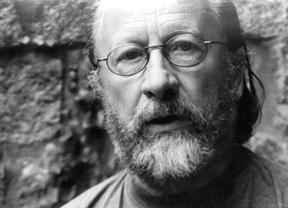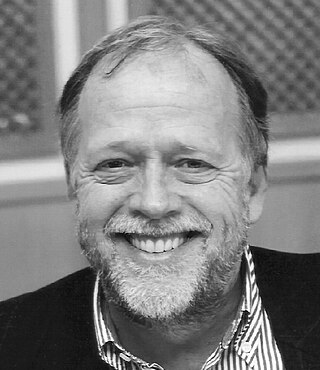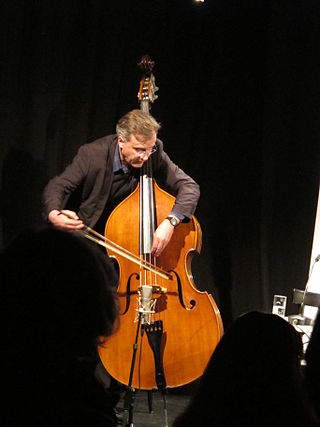
Manos Tsangaris (born 8 December 1956) is a German composer, musician, sound art installation and performance artist, and a poet.

Manos Tsangaris (born 8 December 1956) is a German composer, musician, sound art installation and performance artist, and a poet.
Born in Düsseldorf, Tsangaris studied at the Hochschule für Musik und Tanz Köln from 1976 to 1983 composition with Mauricio Kagel and percussion with Christoph Caskel, and at the Kunstakademie Düsseldorf with Alfonso Hüppi. Since 1980, he has participated several times in the Darmstädter Ferienkurse for Neue Musik and worked for the Münchner Kammerspiele. In 1991, he was invited by the Soviet composers' association as artist-in-residence in Moscow, in the same year he received the Bernd Alois Zimmermann scholarship from the city of Cologne, in 1992/93, the scholarship at the Akademie Schloss Solitude and in 1997 the art prize of the Akademie der Künste (AdK) Berlin, of which he has been a member since 2009. In the same year, he received the Orchestra Prize of the Donaueschinger Musiktage for his piece Batsheba. Eat the History. [1] [2] Since 2012, he is head of the AdK section music. [3] In 2017, he was elected full member of the Bayerische Akademie der Schönen Künste in the music section. [4]
Since the 1970s, Tsangaris has published poems, performed as a soloist and with various music groups (including Ritim Grup and MIR) and exhibited drawings, theatre machinery and sound installations. He participated in festivals such as Cologne–New York in New York (1989), Ars Electronica in Linz (1991), Linz; "Sound Ways" in Saint Petersburg (1995), "Yokohama Arts" (1997) and the "Musica-Festival Strasbourg" (1998).
Tsangaris has composed works commissioned by the Westdeutscher Rundfunk, the Südwestrundfunk, the Bayerische Staatsoper, the Kölner Philharmonie, the Diözesanmuseum Köln, the Kunststiftung Nordrhein-Westfalen, the Katholisches Bildungswerk Köln and the city of Witten. He is also active as a percussionist; he plays with Jaki Liebezeit and other percussionists in the improvisation ensemble Drums Off Chaos .
In 2009, he was appointed professor of composition at the Hochschule für Musik Dresden. In 2015 he was a scholarship holder at the Villa Massimo in Rome. [5] In 2016, Tsangaris took over the artistic direction of the Munich Biennale together with the Swiss composer Daniel Ott (as successor to Peter Ruzicka). [6] [7]

Aribert Reimann was a German composer, pianist, and accompanist, known especially for his literary operas. His version of Shakespeare's King Lear, the opera Lear, was written at the suggestion of Dietrich Fischer-Dieskau, who performed the title role. His opera Medea after Grillparzer's play premiered in 2010 at the Vienna State Opera. He was a professor of contemporary Lied in Hamburg and Berlin. In 2011, he was awarded the Ernst von Siemens Music Prize for his life's work.
Günter Bialas was a German composer.

Georg Katzer was a German composer and teacher. The last master student of Hanns Eisler, he composed music in many genres, including works for the stage. Katzer was one of the pioneers of electronic new music in the German Democratic Republic and the founder of the first electronic-music studio in the GDR. He held leading positions in music organisations, first in the East, then in the united Germany, and received many awards, including the Art Prize of the German Democratic Republic, the National Prize of the German Democratic Republic, the Order of Merit of the Federal Republic of Germany, and the German Music Authors' Prize.

Michael Obst is a German composer and pianist.
Helmut Oehring is a German composer. He was born in East-Berlin, the son of deaf parents. After training as a construction worker, Oehring worked as a cemetery gardener, forest worker, geriatric nurse and stoker. He is self-taught as guitarist and composer. From 1990 to 1992, Oehring studied with Friedrich Goldmann and Georg Katzer at the Academy of Arts, Berlin. He was a fellow of Villa Massimo in 1994/1995. Oering is honorary professor for Théatre musical at the University of the Arts Bern.

Jürg Baur was a German composer whose works include Incontri and Mutazioni. Baur studied at the Cologne University of Music and taught there in his later years. Baur was also awarded the Federal Cross of Merit.
Max Beckschäfer is a German organist, composer and academic who taught at the Hochschule für Musik und Theater München and the Hochschule für Musik Augsburg-Nürnberg. He received commissions from the Munich Biennale, the concert series Klangspuren, the Dresdner Kreuzchor, the Palucca-Ballettschule Dresden and Die Singphoniker. He wrote an organ version of Reger's Hebbel-Requiem.
Carola Bauckholt is a German composer. She was born in Krefeld, West Germany. She worked at the Marienplatz Theater in Krefeld and studied music with Mauricio Kagel at the Cologne College of Music and Dance from 1978–84.

Sandeep Bhagwati is a German composer of western classical music and an academic teacher.

Jan Müller-Wieland is a German composer and conductor of classical music and an academic teacher. He is known for his operas.
Enno Poppe is a German composer and conductor of classical music, and an academic teacher.
Manfred Trojahn is a German composer, flutist, conductor, writer and academic teacher.

Jan Wagner is a German poet, essayist and translator, recipient of the Georg Büchner Prize and Leipzig Book Fair Prize.
Karl Maria Zwißler was a German conductor, and academic. He was for decades the Generalmusikdirektor and Intendant of the Staatstheater Mainz. He taught conducting at the music universities of Stuttgart and Frankfurt.
Michael Reudenbach is a German composer. He performs as an interpreter of Early and New Music.

Christoph Caskel was a German percussionist and teacher.

Christian Dierstein is a German percussionist and academic teacher. He has performed internationally as a soloist and as a regular chamber music player with ensemble recherche and Trio Accanto, performing several world premieres. He has been a professor from 2001, with a focus on music beyond Europe and improvisation.
Daniel Ott is a Swiss composer.
Horst Leuchtmann was a German musicologist.
Birke Jasmin Bertelsmeier is a German composer.